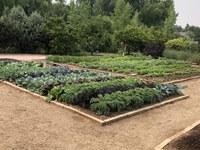Dakota Gardener: Keep calm and garden on
(Click an image below to view a high-resolution image that can be downloaded)
By Esther E. McGinnis, Horticulturist
NDSU Extension
Last week while teaching class, a student asked me to comment on a recent viral news article stating that urban agriculture generates six times more carbon than conventional agriculture. After class, I read the news article as well as the original scientific study. What I read left me perplexed and skeptical.
Published in Nature Cities, several researchers from the U.S., United Kingdom, Germany, Poland and France compared the carbon footprint of large conventional fruit and vegetable farms with urban agriculture producers. I was immediately skeptical because the term, urban agriculture, is so broad as to be almost meaningless. The study indicates that the researchers defined urban agriculture as home gardeners, community gardeners, and commercial fruit and vegetable producers that produced within city limits.
Why are we comparing apples and oranges? Why is it necessary to compare commercial horticulture with backyard gardening or with community gardens? It is no surprise that home gardeners and community gardeners produce less efficiently than their commercial counterparts.
Professional fruit and vegetable farmers have the benefit of training, economies of scale and business longevity. Furthermore, a major difference arises in growing methods. Home and community gardeners frequently grow vegetables in raised garden beds to prevent back pain from bending over. The raised bed infrastructure was deemed to be more carbon-intensive than growing fruits and vegetables in the soil.
A more just comparison is obtained by comparing professional fruit and vegetable producers that grow in rural areas versus within city limits. The study in question showed that both groups on average produced similar amounts of carbon.
No doubt, the researchers were trying to argue that home and community gardeners can be more sustainable. I do not dispute that. However, we must recognize the value of the social, psychological, and health benefits of home and community gardening.
Many of the Extension Master Gardeners that I have trained participate in community gardening efforts around the region. They teach the art and science of gardening to new gardeners, work alongside one another and share the bounty. I would argue that the sense of community that is produced more than offsets the carbon inputs of raised garden beds and garden sheds.
Children are more likely to try fruits and vegetables when they grow it. For years, my own daughter hated tomatoes. One day she worked up the courage to try a homegrown heirloom tomato and she was hooked!
While I agree that we should be cognizant of our gardening inputs, the outputs are equally important—namely mouthwatering vegetables, improved diets, physical exercise, social connections and the satisfaction of feeding oneself.
The above study is getting a lot of publicity but its comparisons are irrelevant. Keep calm and garden on.
NDSU Agriculture Communication – Feb. 13, 2024
Source: Esther McGinnis, 701-231-7406, esther.mcginnis@ndsu.edu
Editor: Kelli Anderson, 701-231-7006, kelli.c.anderson@ndsu.edu




